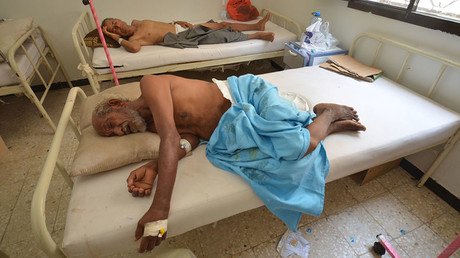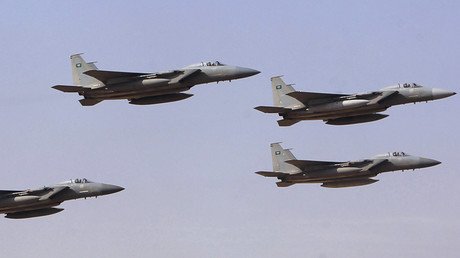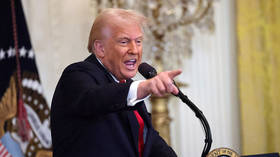‘Only 10 years old': Yemen sees spike in parents marrying off young daughters for cash
Extremely young girls are paying the price for Yemen's brutal civil war, being married off by their own families, which are struggling to make ends meet. RT spoke to a mother who managed to save her 10-year-old daughter from becoming a child bride.
A woman by the name of Nasrine told RT that her 10-year-old daughter Mlak has already been engaged to an elderly man, a deal which was apparently arranged by the girl’s father against the Nasrine’s will. The mother and daughter were able to receive help from the Yemen Women’s Union, and the deal did not go through.
However, Nasrine says she is still worried for her daughter, fearing the father will one day kidnap her in another attempt to sell her as a child bride.
“I'm totally against the idea of her marrying so young. It doesn't matter who the man is, she's just a child and should go to school. She's only 10, she wouldn't survive marriage,” Nasrine told RT.
“I don't know what will happen to us, but my only goal is my daughter's education. She hasn't been going to school for two years, because I'm afraid that one day her father will kidnap her and marry her off. Because of that, she has lost the chance to play and learn,” she continued.
Early marriage has become “alarmingly widespread” in war-struck Yemen, UNICEF said in March, as cited by AP.
The organization conducted a survey in six provinces in September. Some 72 percent of women said they were married by the time they were 18, and 44 percent were married by age 15. Before the war, similar surveys 50 percent would say they were married before 18, UNICEF says.
Hayat al-Kinai, an activist from the Yemen Women's Union who helped Nasrine and Mlak, told RT that the country is now seeing “many stories on early marriage.”
She said that even if mothers do not want to marry their daughters, they feel they are left with little choice.
READ MORE: Saudi Arabia is just ‘defending itself’ when it bombs Yemen, claims UK defense secretary
“The poverty is very, very high, and so they accept to marry their daughters,” she said.
Meanwhile, UNICEF regional director Geert Cappelaere told RT that the problems that exist in Yemen “do not have to be there.”
“These problems are of human making, and the main issue is that Yemen is at war, and so the simple way of stopping all of this is stopping the conflict, is investing back in a country that requires development, investing in the education of children, investing in the health of the children,” he said.
“What is today invested in fighting each other needs to be invested into the most vulnerable Yemenis, the boys and girls of Yemen.”
However, the war in Yemen shows no signs of stopping, with the Saudi-led coalition's campaign in its third year.
The Saudi-led coalition, backed by the US, launched an aerial campaign against Shiite Houthi rebels in March 2015, and later launched a ground operation. The coalition is allied to Abd Rabbu Mansour Hadi, who fled to Saudi Arabia when the Houthis took power in Yemen.
A senior UN official estimated in January that the death toll in Yemen's conflict had exceeded 10,000 people, including 4,000 civilians. Some 17 million people in the war-torn country are also at imminent risk of famine, according to UN estimates.
The coalition has long been accused of civilian casualties, with a September report by the Yemen Data Project concluding that one-third of Saudi airstrikes hit hospitals, schools, and other civilian targets. Those figures were denounced as “vastly exaggerated” by Saudi Foreign Minister Adel al-Jubeir, who spoke to the Guardian.
Saudi Arabia has denied targeting innocent Yemenis, instead accusing the Houthis of using civilian installations to conceal weapons and launch missile attacks against Riyadh with help from Iran – claims which Tehran denies.
Meanwhile, the US continues to support Saudi Arabia, with President Donald Trump striking an arms deal with Riyadh last month which totaled $350 billion. The agreement is said to be aimed at bolstering security “in the face of Iranian threats.”















